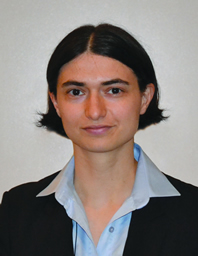
New basic research on inflammatory dendritic cells offers greater understanding of how these cells function that could lead to new immunotherapies for inflammatory diseases such as RA and psoriasis, according Elodie Segura, PhD, Research Associate at the Institut Curie in Paris.
Dr. Segura presented basic research Monday that she and colleagues have been conducting at the Curie Institute as part of the ACR session Regulatory Inflammatory Dendritic Cells.
Dendritic cells are key regulators of the immune system that act as antigen-presenting cells capable of activating naïve T cells and stimulating the development and differentiation of B cells. Dr. Segura said that dendritic cell precursors originate in bone marrow and give rise to resident dendritic cells in lymph nodes and migratory dendritic cells in skin.
Resident and migratory dendritic cells are subsets of dendritic cells identified in mice that differ in phenotype and functional properties. During inflammation, an inflammatory dendritic cell subtype arises that differs from monocytes recruited to the site of inflammation.
Resident dendritic cells induce both T-helper 1 and T-helper 2 (Th2) cytokines in naïve allogeneic T lymphocytes. Some migratory dendritic cells do not activate T cells well, but others induce Th2 polarization.
“Dendritic cells in lymph nodes display an activated phenotype and retain their functional properties after migration. They acquire their full functional abilities once in lymph nodes,” she said. “Murine inflammatory dendritic cells have a distinct phenotype and are present in the inflamed joint in a collagen-induced arthritis model.”
Dr. Segura and her colleagues analyzed dendritic cells in human synovial fluid and tumor ascites. Human arthritic synovial fluid and tumor ascites contain cells displaying typical dendritic cell morphology and function, while inflammatory dendritic cells have a phenotype that differs from the typical dendritic cells, she said.
Inflammatory dendritic cells share transcriptional pathways with typical dendritic cells and express transcription factors of the dendritic cell lineage. The researchers conducted a transcriptome analysis showing that inflammatory dendritic cells most likely represent the in vivo counterpart of monocyte-derived dendritic cells.
Inflammatory dendritic cells express the CCR7 gene, which governs skin dendritic cell migration under both inflammatory and steady state conditions.
Inflammatory dendritic cells stimulate T-helper 17 (Th17) cell polarization and Th17 development. These cells are associated with autoimmune diseases such as rheumatoid arthritis, psoriasis, and multiple sclerosis. In Th17 polarization, IL-6, IL-6-beta, TGF-beta, and IL-23 have been proposed to induce the development of Th17 cells, she said. Inflammatory dendritic cells secrete these Th17 polarizing cytokines.
“Human inflammatory dendritic cells stimulate autologous memory CD4(+) T cells to produce interleukin-17 and induce Th17 cell differentiation from naive CD4(+) T cells through the selective secretion of Th17 cell-polarizing cytokines,” she said.
Dr. Segura and her colleagues concluded that inflammatory dendritic cells represent a distinct human dendritic cell subset. They propose that they are derived from monocytes and are involved in the induction and maintenance of Th17 cell responses.
“Inflammatory dendritic cells induce Th17 polarization through the secretion of Th17-polarizing cytokines. Thus, inflammatory dendritic cells represent a potential target for immunotherapies of inflammatory diseases,” she said.
